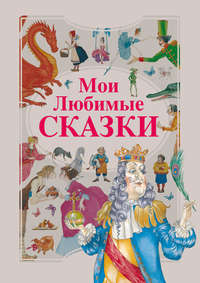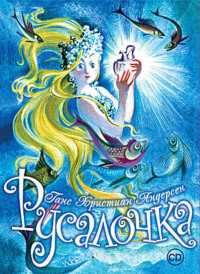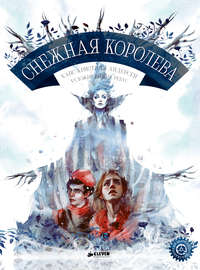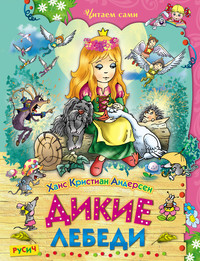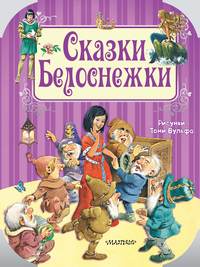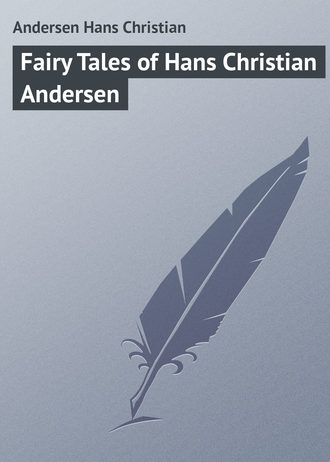 полная версия
полная версияFairy Tales of Hans Christian Andersen
When this story was circulated all over the world, the opinions upon it were divided; but the story remained the same. And, after all, the best way in everything you undertake, great as well as small, is to expect no thanks for anything you may do, even when it refers to "soup from a sausage skewer."
THE STORKS
On the last house in a little village the storks had built a nest, and the mother stork sat in it with her four young ones, who stretched out their necks and pointed their black beaks, which had not yet turned red like those of the parent birds. A little way off, on the edge of the roof, stood the father stork, quite upright and stiff; not liking to be quite idle, he drew up one leg, and stood on the other, so still that it seemed almost as if he were carved in wood. "It must look very grand," thought he, "for my wife to have a sentry guarding her nest. They do not know that I am her husband; they will think I have been commanded to stand here, which is quite aristocratic;" and so he continued standing on one leg.
In the street below were a number of children at play, and when they caught sight of the storks, one of the boldest amongst the boys began to sing a song about them, and very soon he was joined by the rest. These are the words of the song, but each only sang what he could remember of them in his own way.
"Stork, stork, fly away,Stand not on one leg, I pray,See your wife is in her nest,With her little ones at rest.They will hang one,And fry another;They will shoot a third,And roast his brother.""Just hear what those boys are singing," said the young storks; "they say we shall be hanged and roasted."
"Never mind what they say; you need not listen," said the mother. "They can do no harm."
But the boys went on singing and pointing at the storks, and mocking at them, excepting one of the boys whose name was Peter; he said it was a shame to make fun of animals, and would not join with them at all. The mother stork comforted her young ones, and told them not to mind. "See," she said, "How quiet your father stands, although he is only on one leg."
"But we are very much frightened," said the young storks, and they drew back their heads into the nests.
The next day when the children were playing together, and saw the storks, they sang the song again —
"They will hang one,And roast another.""Shall we be hanged and roasted?" asked the young storks.
"No, certainly not," said the mother. "I will teach you to fly, and when you have learnt, we will fly into the meadows, and pay a visit to the frogs, who will bow themselves to us in the water, and cry 'Croak, croak,' and then we shall eat them up; that will be fun."
"And what next?" asked the young storks.
"Then," replied the mother, "all the storks in the country will assemble together, and go through their autumn manoeuvres, so that it is very important for every one to know how to fly properly. If they do not, the general will thrust them through with his beak, and kill them. Therefore you must take pains and learn, so as to be ready when the drilling begins."
"Then we may be killed after all, as the boys say; and hark! they are singing again."
"Listen to me, and not to them," said the mother stork. "After the great review is over, we shall fly away to warm countries far from hence, where there are mountains and forests. To Egypt, where we shall see three-cornered houses built of stone, with pointed tops that reach nearly to the clouds. They are called Pyramids, and are older than a stork could imagine; and in that country, there is a river that overflows its banks, and then goes back, leaving nothing but mire; there we can walk about, and eat frogs in abundance."
"Oh, o – h!" cried the young storks.
"Yes, it is a delightful place; there is nothing to do all day long but eat, and while we are so well off out there, in this country there will not be a single green leaf on the trees, and the weather will be so cold that the clouds will freeze, and fall on the earth in little white rags." The stork meant snow, but she could not explain it in any other way.
"Will the naughty boys freeze and fall in pieces?" asked the young storks.
"No, they will not freeze and fall into pieces," said the mother, "but they will be very cold, and be obliged to sit all day in a dark, gloomy room, while we shall be flying about in foreign lands, where there are blooming flowers and warm sunshine."
Time passed on, and the young storks grew so large that they could stand upright in the nest and look about them. The father brought them, every day, beautiful frogs, little snakes, and all kinds of stork-dainties that he could find. And then, how funny it was to see the tricks he would perform to amuse them. He would lay his head quite round over his tail, and clatter with his beak, as if it had been a rattle; and then he would tell them stories all about the marshes and fens.
"Come," said the mother one day, "Now you must learn to fly." And all the four young ones were obliged to come out on the top of the roof. Oh, how they tottered at first, and were obliged to balance themselves with their wings, or they would have fallen to the ground below.
"Look at me," said the mother, "you must hold your heads in this way, and place your feet so. Once, twice, once, twice – that is it. Now you will be able to take care of yourselves in the world."
Then she flew a little distance from them, and the young ones made a spring to follow her; but down they fell plump, for their bodies were still too heavy.
"I don't want to fly," said one of the young storks, creeping back into the nest. "I don't care about going to warm countries."
"Would you like to stay here and freeze when the winter comes?" said the mother, "or till the boys comes to hang you, or to roast you? – Well then, I'll call them."
"Oh no, no," said the young stork, jumping out on the roof with the others; and now they were all attentive, and by the third day could fly a little. Then they began to fancy they could soar, so they tried to do so, resting on their wings, but they soon found themselves falling, and had to flap their wings as quickly as possible. The boys came again in the street singing their song: —
"Stork, stork, fly away.""Shall we fly down, and pick their eyes out?" asked the young storks.
"No; leave them alone," said the mother. "Listen to me; that is much more important. Now then. One-two-three. Now to the right. One-two-three. Now to the left, round the chimney. There now, that was very good. That last flap of the wings was so easy and graceful, that I shall give you permission to fly with me to-morrow to the marshes. There will be a number of very superior storks there with their families, and I expect you to show them that my children are the best brought up of any who may be present. You must strut about proudly – it will look well and make you respected."
"But may we not punish those naughty boys?" asked the young storks.
"No; let them scream away as much as they like. You can fly from them now up high amid the clouds, and will be in the land of the pyramids when they are freezing, and have not a green leaf on the trees or an apple to eat."
"We will revenge ourselves," whispered the young storks to each other, as they again joined the exercising.
Of all the boys in the street who sang the mocking song about the storks, not one was so determined to go on with it as he who first began it. Yet he was a little fellow not more than six years old. To the young storks he appeared at least a hundred, for he was so much bigger than their father and mother. To be sure, storks cannot be expected to know how old children and grown-up people are. So they determined to have their revenge on this boy, because he began the song first and would keep on with it. The young storks were very angry, and grew worse as they grew older; so at last their mother was obliged to promise that they should be revenged, but not until the day of their departure.
"We must see first, how you acquit yourselves at the grand review," said she. "If you get on badly there, the general will thrust his beak through you, and you will be killed, as the boys said, though not exactly in the same manner. So we must wait and see."
"You shall see," said the young birds, and then they took such pains and practised so well every day, that at last it was quite a pleasure to see them fly so lightly and prettily. As soon as the autumn arrived, all the storks began to assemble together before taking their departure for warm countries during the winter. Then the review commenced. They flew over forests and villages to show what they could do, for they had a long journey before them. The young storks performed their part so well that they received a mark of honor, with frogs and snakes as a present. These presents were the best part of the affair, for they could eat the frogs and snakes, which they very quickly did.
"Now let us have our revenge," they cried.
"Yes, certainly," cried the mother stork. "I have thought upon the best way to be revenged. I know the pond in which all the little children lie, waiting till the storks come to take them to their parents. The prettiest little babies lie there dreaming more sweetly than they will ever dream in the time to come. All parents are glad to have a little child, and children are so pleased with a little brother or sister. Now we will fly to the pond and fetch a little baby for each of the children who did not sing that naughty song to make game of the storks."
"But the naughty boy, who began the song first, what shall we do to him?" cried the young storks.
"There lies in the pond a little dead baby who has dreamed itself to death," said the mother. "We will take it to the naughty boy, and he will cry because we have brought him a little dead brother. But you have not forgotten the good boy who said it was a shame to laugh at animals: we will take him a little brother and sister too, because he was good. He is called Peter, and you shall all be called Peter in future."
So they all did what their mother had arranged, and from that day, even till now, all the storks have been called Peter.
THE STORM SHAKES THE SHIELD
In the old days, when grandpapa was quite a little boy, and ran about in little red breeches and a red coat, and a feather in his cap – for that's the costume the little boys wore in his time when they were dressed in their best – many things were very different from what they are now. There was often a good deal of show in the streets – show that we don't see nowadays, because it has been abolished as too old-fashioned. Still, it is very interesting to hear grandfather tell about it.
It must really have been a gorgeous sight to behold, in those days, when the shoemaker brought over the shield, when the court-house was changed. The silken flag waved to and fro, on the shield itself a double eagle was displayed, and a big boot; the youngest lads carried the "welcome," and the chest of the workmen's guild, and their shirt-sleeves were adorned with red and white ribbons; the elder ones carried drawn swords, each with a lemon stuck on its point. There was a full band of music, and the most splendid of all the instruments was the "bird," as grandfather called the big stick with the crescent on the top, and all manner of dingle-dangles hanging to it – a perfect Turkish clatter of music. The stick was lifted high in the air, and swung up and down till it jingled again, and quite dazzled one's eyes when the sun shone on all its glory of gold, and silver, and brass.
In front of the procession ran the Harlequin, dressed in clothes made of all kinds of colored patches artfully sewn together, with a black face, and bells on his head like a sledge horse. He beat the people with his bat, which made a great clattering without hurting them, and the people would crowd together and fall back, only to advance again the next moment. Little boys and girls fell over their own toes into the gutter, old women dispensed digs with their elbows, and looked sour, and took snuff. One laughed, another chatted; the people thronged the windows and door-steps, and even all the roofs. The sun shone; and although they had a little rain too, that was good for the farmer; and when they got wetted thoroughly, they only thought what a blessing it was for the country.
And what stories grandpapa could tell! As a little boy he had seen all these fine doings in their greatest pomp. The oldest of the policemen used to make a speech from the platform on which the shield was hung up, and the speech was in verse, as if it had been made by a poet, as, indeed it had; for three people had concocted it together, and they had first drunk a good bowl of punch, so that the speech might turn out well.
And the people gave a cheer for the speech, but they shouted much louder for the Harlequin, when he appeared in front of the platform, and made a grimace at them.
The fools played the fool most admirably, and drank mead out of spirit-glasses, which they then flung among the crowd, by whom they were caught up. Grandfather was the possessor of one of these glasses, which had been given him by a working mason, who had managed to catch it. Such a scene was really very pleasant; and the shield on the new court-house was hung with flowers and green wreaths.
"One never forgets a feast like that, however old one may grow," said grandfather. Nor did he forget it, though he saw many other grand spectacles in his time, and could tell about them too; but it was most pleasant of all to hear him tell about the shield that was brought in the town from the old to the new court-house.
Once, when he was a little boy, grandpapa had gone with his parents to see this festivity. He had never yet been in the metropolis of the country. There were so many people in the streets, that he thought that the shield was being carried. There were many shields to be seen; a hundred rooms might have been filled with pictures, if they had been hung up inside and outside. At the tailor's were pictures of all kinds of clothing, to show that he could stitch up people from the coarsest to the finest; at the tobacco manufacturer's were pictures of the most charming little boys, smoking cigars, just as they do in reality; there were signs with painted butter, and herring, clerical collars, and coffins, and inscriptions and announcements into the bargain. A person could walk up and down for a whole day through the streets, and tire himself out with looking at the pictures; and then he would know all about what people lived in the houses, for they had hung out their shields or signs; and, as grandfather said, it was a very instructive thing, in a great town, to know at once who the inhabitants were.
And this is what happened with these shields, when grandpapa came to the town. He told it me himself, and he hadn't "a rogue on his back," as mother used to tell me he had when he wanted to make me believe something outrageous, for now he looked quite trustworthy.
The first night after he came to the town had been signalized by the most terrible gale ever recorded in the newspapers – a gale such as none of the inhabitants had ever before experienced. The air was dark with flying tiles; old wood-work crashed and fell; and a wheelbarrow ran up the streets all alone, only to get out of the way. There was a groaning in the air, and a howling and a shrieking, and altogether it was a terrible storm. The water in the canal rose over the banks, for it did not know where to run. The storm swept over the town, carrying plenty of chimneys with it, and more than one proud weathercock on a church tower had to bow, and has never got over it from that time.
There was a kind of sentry-house, where dwelt the venerable old superintendent of the fire brigade, who always arrived with the last engine. The storm would not leave this little sentry-house alone, but must needs tear it from its fastenings, and roll it down the street; and, wonderfully enough, it stopped opposite to the door of the dirty journeyman plasterer, who had saved three lives at the last fire, but the sentry-house thought nothing of that.
The barber's shield, the great brazen dish, was carried away, and hurled straight into the embrasure of the councillor of justice; and the whole neighborhood said this looked almost like malice, inasmuch as they, and nearly all the friends of the councillor's wife, used to call that lady "the Razor" for she was so sharp that she knew more about other people's business than they knew about it themselves.
A shield with a dried salt fish painted on it flew exactly in front of the door of a house where dwelt a man who wrote a newspaper. That was a very poor joke perpetrated by the gale, which seemed to have forgotten that a man who writes in a paper is not the kind of person to understand any liberty taken with him; for he is a king in his own newspaper, and likewise in his own opinion.
The weathercock flew to the opposite house, where he perched, looking the picture of malice – so the neighbors said.
The cooper's tub stuck itself up under the head of "ladies' costumes."
The eating-house keeper's bill of fare, which had hung at his door in a heavy frame, was posted by the storm over the entrance to the theatre, where nobody went. "It was a ridiculous list – horse-radish, soup, and stuffed cabbage." And now people came in plenty.
The fox's skin, the honorable sign of the furrier, was found fastened to the bell-pull of a young man who always went to early lecture, and looked like a furled umbrella. He said he was striving after truth, and was considered by his aunt "a model and an example."
The inscription "Institution for Superior Education" was found near the billiard club, which place of resort was further adorned with the words, "Children brought up by hand." Now, this was not at all witty; but, you see, the storm had done it, and no one has any control over that.
It was a terrible night, and in the morning – only think! – nearly all the shields had changed places. In some places the inscriptions were so malicious, that grandfather would not speak of them at all; but I saw that he was chuckling secretly, and there may have been some inaccuracy in his description, after all.
The poor people in the town, and still more the strangers, were continually making mistakes in the people they wanted to see; nor was this to be avoided, when they went according to the shields that were hung up. Thus, for instance, some who wanted to go to a very grave assembly of elderly men, where important affairs were to be discussed, found themselves in a noisy boys' school, where all the company were leaping over the chairs and tables.
There were also people who made a mistake between the church and the theatre, and that was terrible indeed!
Such a storm we have never witnessed in our day; for that only happened in grandpapa's time, when he was quite a little boy. Perhaps we shall never experience a storm of the kind, but our grandchildren may; and we can only hope and pray that all may stay at home while the storm is moving the shields.
THE STORY OF A MOTHER
A mother sat by her little child; she was very sad, for she feared it would die. It was quite pale, and its little eyes were closed, and sometimes it drew a heavy deep breath, almost like a sigh; and then the mother gazed more sadly than ever on the poor little creature. Some one knocked at the door, and a poor old man walked in. He was wrapped in something that looked like a great horse-cloth; and he required it truly to keep him warm, for it was cold winter; the country everywhere lay covered with snow and ice, and the wind blew so sharply that it cut one's face. The little child had dozed off to sleep for a moment, and the mother, seeing that the old man shivered with the cold, rose and placed a small mug of beer on the stove to warm for him. The old man sat and rocked the cradle; and the mother seated herself on a chair near him, and looked at her sick child who still breathed heavily, and took hold of its little hand.
"You think I shall keep him, do you not?" she said. "Our all-merciful God will surely not take him away from me."
The old man, who was indeed Death himself, nodded his head in a peculiar manner, which might have signified either Yes, or No; and the mother cast down her eyes, while the tears rolled down her cheeks. Then her head became heavy, for she had not closed her eyes for three days and nights, and she slept, but only for a moment. Shivering with cold, she started up and looked round the room. The old man was gone, and her child – it was gone too! – the old man had taken it with him. In the corner of the room the old clock began to strike; "whirr" went the chains, the heavy weight sank to the ground, and the clock stopped; and the poor mother rushed out of the house calling for her child. Out in the snow sat a woman in long black garments, and she said to the mother, "Death has been with you in your room. I saw him hastening away with your little child; he strides faster than the wind, and never brings back what he has taken away."
"Only tell me which way he has gone," said the mother; "tell me the way, I will find him."
"I know the way," said the woman in the black garments; "but before I tell you, you must sing to me all the songs that you have sung to your child; I love these songs, I have heard them before. I am Night, and I saw your tears flow as you sang."
"I will sing them all to you," said the mother; "but do not detain me now. I must overtake him, and find my child."
But Night sat silent and still. Then the mother wept and sang, and wrung her hands. And there were many songs, and yet even more tears; till at length Night said, "Go to the right, into the dark forest of fir-trees; for I saw Death take that road with your little child."
Within the wood the mother came to cross roads, and she knew not which to take. Just by stood a thorn-bush; it had neither leaf nor flower, for it was the cold winter time, and icicles hung on the branches. "Have you not seen Death go by, with my little child?" she asked.
"Yes," replied the thorn-bush; "but I will not tell you which way he has taken until you have warmed me in your bosom. I am freezing to death here, and turning to ice."
Then she pressed the bramble to her bosom quite close, so that it might be thawed, and the thorns pierced her flesh, and great drops of blood flowed; but the bramble shot forth fresh green leaves, and they became flowers on the cold winter's night, so warm is the heart of a sorrowing mother. Then the bramble-bush told her the path she must take. She came at length to a great lake, on which there was neither ship nor boat to be seen. The lake was not frozen sufficiently for her to pass over on the ice, nor was it open enough for her to wade through; and yet she must cross it, if she wished to find her child. Then she laid herself down to drink up the water of the lake, which was of course impossible for any human being to do; but the bereaved mother thought that perhaps a miracle might take place to help her. "You will never succeed in this," said the lake; "let us make an agreement together which will be better. I love to collect pearls, and your eyes are the purest I have ever seen. If you will weep those eyes away in tears into my waters, then I will take you to the large hothouse where Death dwells and rears flowers and trees, every one of which is a human life."
"Oh, what would I not give to reach my child!" said the weeping mother; and as she still continued to weep, her eyes fell into the depths of the lake, and became two costly pearls.
Then the lake lifted her up, and wafted her across to the opposite shore as if she were on a swing, where stood a wonderful building many miles in length. No one could tell whether it was a mountain covered with forests and full of caves, or whether it had been built. But the poor mother could not see, for she had wept her eyes into the lake. "Where shall I find Death, who went away with my little child?" she asked.
"He has not arrived here yet," said an old gray-haired woman, who was walking about, and watering Death's hothouse. "How have you found your way here? and who helped you?"
"God has helped me," she replied. "He is merciful; will you not be merciful too? Where shall I find my little child?"
"I did not know the child," said the old woman; "and you are blind. Many flowers and trees have faded to-night, and Death will soon come to transplant them. You know already that every human being has a life-tree or a life-flower, just as may be ordained for him. They look like other plants; but they have hearts that beat. Children's hearts also beat: from that you may perhaps be able to recognize your child. But what will you give me, if I tell you what more you will have to do?


